Amid War On Terror, Influential Pakistan Army General To Retire

Pakistan’s influential army Gen. Raheel Sharif will retire later this year, ending speculation that he might extend his service as leader of ground forces, the military announced Monday. Leader of the army is a carefully watched post given the Pakistan military’s repeated history of staging coups and its heavy influence in the capital Islamabad, but Sharif’s retirement will also raise questions over continuity in the fight against terrorism, which he had been credited with bringing under control.
“Pakistan army is a great institution. I don’t believe in extension,” said Sharif, according to a Wall Street Journal report. “Efforts to root out terrorism will continue with full vigor and resolve.”
Sharif has often clashed with Prime Minister Nawaz Sharif over the county’s security situation and foreign policy initiatives, criticizing him for inaction combating extremist groups in the northwest on the border with Afghanistan. Sharif also exercised his influence to combat corruption in politics, make peace deals with the Pakistani Taliban, and promote dialogue with India, the U.S. and countries in the Middle East.
“In Pakistan, an army chief is one of the pivots of power,” Hasan Askari Rizvi, a military analyst in the eastern city of Lahore, told the Wall Street Journal. “Gen. Raheel is strong because he was able to deliver on terrorism.”
Security officials in Karachi have questioned whether the next army leader will be as aggressive as Sharif has been in combating terror threats in the huge, unruly port city on the Arabian Sea, where businesses have been subject to extortion and threats.
Sharif retiring on schedule would mark the first time since 1998 that a leader of the army hasn’t extended his tenure. Democracy was restored in Pakistan in 2008 after the 1999 coup by Gen. Pervez Musharraf — the fourth military takeover since independence in 1947.
“We are passing through an era in Pakistan in which political governments complete their tenure and hand over power to the next, and one chief justice makes way for the next,” Tallal Chaudry, a lawmaker from the ruling Pakistan Muslim League-N, told the Wall Street Journal. “Similarly, in this institution [army] as well, one chief will hand it over to the next. In this era, the law is being followed, and should be."
© Copyright IBTimes 2024. All rights reserved.






















